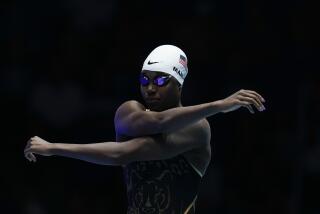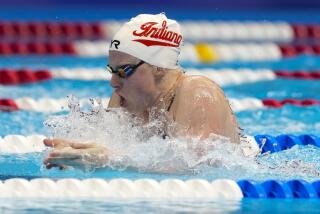Patriotic Stroke : Swimming: Lawrence Ocon of Valley College competed in the Central American Games for Nicaragua and won a bronze medal.
The possibility of a chilly reception had crossed Lawrence Ocon’s mind more than once before the Valley College water polo player accepted an invitation to compete for Nicaragua in last week’s Central American Games in Tegucigalpa, Honduras.
His North American clothes and mannerisms were certain to draw the attention of his new teammates. Even his soft-spoken Spanish was different.
But after taking all that into account, Ocon was still ill-prepared for the frigidity he encountered when he showed up for his first event.
“The pool was freezing,” Ocon said.
The result was predictable; a leg cramp caused him to finish a non-qualifying ninth in his heat of the 100-meter butterfly.
“I’m used to swimming in really, really warm water,” he said. “It’s the same in Nicaragua because it’s hot all the time. But in Honduras, the water was in the low 60s.”
It was an inauspicious start for Ocon, who the day before had been heralded by one Nicaragua newspaper as “the main hope” for a medal in swimming (Nicaragua doesn’t have a water polo team.). But before the nine-day competition had ended, Ocon proved worthy of the praise, twice breaking the Central American record en route to a bronze in the 50-meter freestyle.
Ocon, a sophomore at Valley College who scored a school-record 196 goals in two All-Pacific League water polo seasons at Glendale High, first came to the attention of Nicaraguan officials during a trip to Managua last May.
His father, Max, left Nicaragua more than 30 years ago and runs a courier service between Los Angeles and Managua. He also has organized a number of trips to Nicaragua for athletic groups, including a visit last summer by the San Bernardino Indians, a semipro baseball team that represented the United States in a multi-nation tournament.
As a result, Max visits the country frequently and has developed numerous ties in the country’s sporting circles, one of which led to an invitation for Lawrence to work out with Nicaragua’s national swim team.
“He really wasn’t in shape when we went down there; he hadn’t worked out in a couple of months,” Max said. “But they were interested in seeing him swim. The heat really bothered him, but he still beat all their top swimmers in the sprints.
“Afterward, the coach showed him a schedule and said that if he followed the schedule, he could be on the team for the Central American Games.”
Although Lawrence was born in the United States, his father’s nationality makes him eligible to represent Nicaragua in international competition, according to Jeff Diamond, information services director for US Swimming, the sport’s governing body in this country. Still, Ocon was hesitant to accept Nicaragua’s invitation. The fact that he hadn’t swum competitively since high school, and the timing of the Games, during Valley’s semester finals, were two reasons.
“I didn’t want to lose a semester just to go to Central America,” said Ocon, who hopes to transfer to USC next fall.
But the Nicaraguans were nothing if not persistent. Commandante Emmett Lang, director of the country’s cabinet-level Ministry of Sport, phoned repeatedly and even faxed a formal invitation to Lawrence to join the Nicaraguan team.
Apparently, the strategy worked. After a 23-hour trip, which included a plane flight to Managua to catch a team bus to Honduras, Ocon arrived in Tegucigalpa just hours before his first event. But despite the heavy recruitment, Ocon said team officials never asked for anything special.
“They just said, ‘Do the best you can. That’s all we can ask,’ ” Ocon said. “So I didn’t feel any pressure.”
He might have had he been reading Nicaraguan newspapers. Barricada, the paper of the ruling Sandinista party and Nicaragua’s largest periodical, hailed Ocon in a preview of the swim competition. But two days later, after Ocon’s butterfly debacle, the paper ran a story headlined “Ocon Fails,” in which it listed other foreign residents who had represented Nicaragua in international competition “and have failed.”
But if Barricada was disappointed with the butterfly performance, Ocon wasn’t.
“I didn’t know I was swimming the fly until I got there,” he said. “I really hadn’t trained for this.”
He did better in his second event, the 100-meter freestyle, qualifying seventh in 57.14 seconds. He improved one place in the final, finishing sixth in 56.23.
However in his speciality, the 50 free, he led all qualifiers with a Central American-record 26.04 in the heats. In the final, six of the eight finishers bettered that mark with Ocon clocking 25.43 for third place.
“Moments after the race, everyone had heard I won a bronze and everyone was congratulating me,” Ocon said. “Word got around real fast.”
Ocon said that he was warmly received by his new teammates and was quickly accepted as part of the group. The Nicaraguan team even helped him celebrate his 20th birthday, which took place during the Games.
“Once I got there, I was a Nicaraguan,” he said. “And I wanted my country to win and my country to do well. I was accepted really, really well. I got along really, really well with the other swimmers.”
And despite the volatile state of the region, with the U. S. Army calling the shots in Panama and the governments of both Guatemala and El Salvador facing strong popular insurgencies, politics was a distant topic in Honduras.
“I didn’t hear one word of politics there,” Ocon said. “All anyone talked about was swimming.”
Ocon has been invited to rejoin the Nicaraguan team in October for the Central American and Caribbean Games, which will include Cuba, the Dominican Republic and Mexico, as well as the seven Central American nations. He and brother Leo are hoping to have a water polo team organized by then, but that’s not the best news.
Those Games will be held in Mexico, where the pools are heated.
More to Read
Go beyond the scoreboard
Get the latest on L.A.'s teams in the daily Sports Report newsletter.
You may occasionally receive promotional content from the Los Angeles Times.







